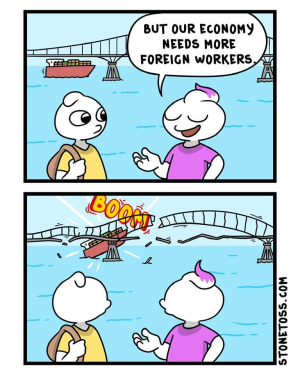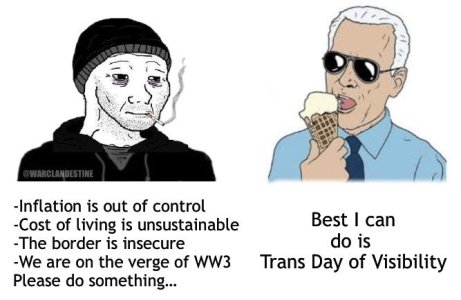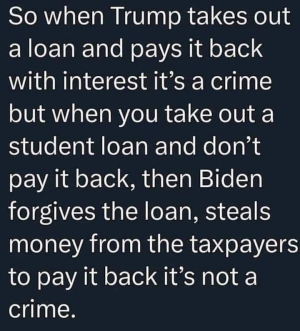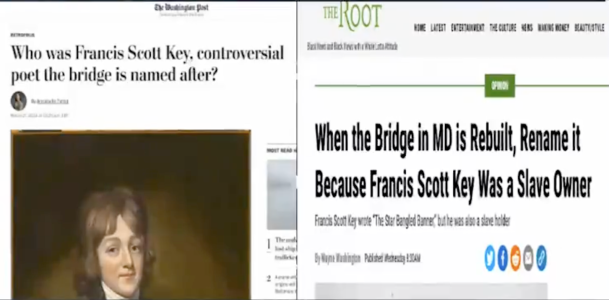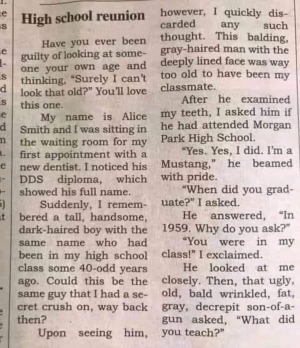Trust me, California knows exactly what it is doing.They refuse to believe that a flourishing economy is the major source of their tax revenue and must be protected. Their nitwit edicts continue to run those who fund the economy out of state and they take their revenue with them. What's left are the consequences of what they imposed It's quite the exhilarating high to have an unlimited amount of money to spend on feel good Socialibdem ideas and not one cent comes out of their personal pockets.
-
In Memory of Rebarcock.
As we navigate life without Pat 'Rebarcock.' Flood, who passed on Sept 21, 2025, we continue to remember the profound impact he had on our community. His support was a cornerstone for our forum. We encourage you to visit the memorial thread to share your memories and condolences. In honor of Pat’s love for storytelling, please contribute to his ‘Rebarcock tells a story’ thread. Your stories will help keep his spirit alive among us.
You are using an out of date browser. It may not display this or other websites correctly.
You should upgrade or use an alternative browser.
You should upgrade or use an alternative browser.
Master Thread Dance Your Cares Away/Fraggle/Law Abiding Citizens
- Thread starter Bryan74b
- Start date
Master Threads
Mallory42
Poster
You’re fookedWhat About South America?
dirtytoeddawg
Legendary
Not an engineer, but this can't be good

 www.instagram.com
www.instagram.com

Gerardo Aquino on Instagram: "Looks fine to me #delawareriver #delawarerivertowns #philly #philadelphia #nature #pennsylvania #newjersey #delaware #naturephotography #river #birds #sullivancatskills #sunrise #newyork #catskills #sunset #visitpa #ne
8,983 likes, 1,121 comments - djditofrito on April 1, 2024: "Looks fine to me #delawareriver #delawarerivertowns #philly #philadelphia #nature #pennsylvania #newjersey #delaware #naturephotography..."
 www.instagram.com
www.instagram.com

In Hilarious April Fools Joke, Congress Announces They Are Working Hard To Serve The American People
WASHINGTON, D.C. — Doing their part to engage in the day's traditional hijinx, the United States Congress played a hilarious April Fools joke by announcing they are working hard to serve the American people.
"It's okay"
ShaolinNole
Legendary
Several spoilers needed there.Thanks for screwing up a perfectly good Monday afternoon!
Goldhedge
Legendary
Hegelian Dialectic
COVID Lessons Learned: A Retrospective After Four Years

Read the Report
Scott W. Atlas, M.D.
Robert Wesson Senior Fellow in Health Policy Hoover Institution,Stanford University Former Advisor to the President and Member,
White House Coronavirus Task Force
Steve H. Hanke, Ph.D.
Professor of Applied Economics at The Johns Hopkins UniversityFounder and co-director of the Johns Hopkins Institute for Applied Economics,
Global Health, and the Study of Business Enterprise
Philip G. Kerpen
President of the Committee to Unleash ProsperityFounder of American Commitment
Casey B. Mulligan, Ph.D.
Professor in Economics at the University of ChicagoSenior Fellow at the Committee to Unleash Prosperity
Former Chief Economist of the White House Council of Economic Advisers
Executive Summary
This report reviews the major policy errors and lessons learned during the COVID pandemic from a balanced perspective that includes health, economic, educational, and civil liberty considerations. We outline ten key lessons that must be learned to avoid mistaken policy responses to future pandemics and other crises.Lesson #1: Leaders Should Calm Public Fears, Not Stoke Them
Lesson #2: Lockdowns Do Not Work to Substantially Reduce Deaths or Stop Viral Circulation
Lesson #3: Lockdowns and Social Isolation Had Negative Consequences that Far Outweighed Benefits
Lesson #4: Government Should Not Pay People More Not to Work
Lesson #5: Shutting Down Schools Was a Major Policy Mistake With Tragic Effects on Children, Especially the Poor
Lesson #6: Masks Were of Little or No Value and Possibly Harmful
Lesson #7: Government Should Not Suppress Dissent or Police the Boundaries of Science
Lesson #8: The Real Hospital Story Was Underutilization
Lesson #9: Protect the Most Vulnerable
Lesson #10: Warp Speed: Deregulate But Don’t Mandate
I threw up in my mouth. Ketchup?As a 5th Gen Texan and I'm sure @tgsio will confirm that shit whatever it is - is NOT brisket!!!!!!
My Ohio husband knows how to smoke brisket. Delicious with a nice bark. And the burnt ends. Flat out legal crack
That shit is not it. Why is it in a Pyrex casserole dish? And what's with the cut? And why isn't it smoked? I can't imagine trying to eat that abomination. My manners would go out the window and, for once, my mama wouldn't slap me upside the head.....or worse...give me the glare of impending death.
Kinda sums him up in one pic.
Last edited:
Disney getting sued again. America first legal doing the litigation. This stuff keeps mounting on Disney. It should be on more of Hollywood but Disney seems to be the frontline so got to hope it collapses. Iger wants to rid the co of all the Walt era politics.... I pray he loses.
Similar threads
- Replies
- 13
- Views
- 573
- Replies
- 6
- Views
- 319
- Replies
- 0
- Views
- 2K
- Replies
- 56
- Views
- 5K

